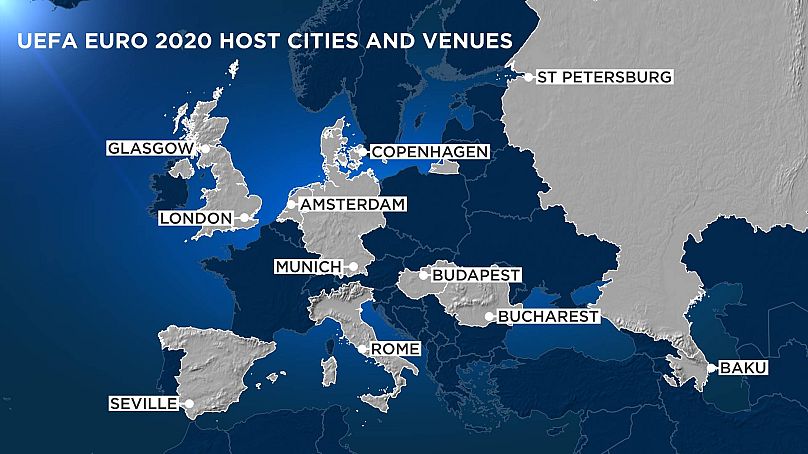Your ultimate guide to this summer's feast of football. Who do you think will win?
Even before the COVID-19 pandemic, the EURO 2020 football championships were supposed to be unlike any other.
To mark the 60th anniversary of the first European Nations' Cup in 1960, then-UEFA President Michel Platini had proposed to hold a "romantic" edition of the competition in 2020.
Instead of one or two host countries, the tournament would be played across 12 European cities over June and July.
But then COVID happened and the tournament was postponed a year. It will, nevertheless, retain 2020 in its name.
Which countries are taking part in EURO 2020?
Twenty-four nations will take part, including the winners of the last European Championships in 2016, Portugal, and World Cup winners France.
Two teams are making their debut at a major football tournament: Finland and North Macedonia.
Of the eleven countries hosting matches, seven -- Denmark, England, Germany, Italy, the Netherlands, Russia, and Spain -- qualified for the tournament.
Two others -- Hungary and Scotland -- made it via the play-offs, while Romania and Azerbaijan missed out.
Greece, the winners of EURO 2004, are the only previous champions who will not be competing in this summer's tournament.
Click on the countries below for a profile of each team in the tournament.
Group A - Turkey, Italy, Wales, Switzerland
Group B - Denmark, Finland, Belgium, Russia
Group C - Netherlands, Ukraine, Austria, North Macedonia
Group D - England, Croatia, Scotland, Czech Republic
Group E - Spain, Sweden, Poland, Slovakia
Group F - Hungary, Portugal, France, Germany
How does the EURO 2020 tournament work?
In the initial group stage, the four teams play each other.
The winners and runners-up of each group, as well as the four best third-placed teams, will advance to the last 16 countries left in the tournament.
This is the knockout stage. The winner advances to the quarter-finals or the last eight teams. Then the semi-finals before the final on July 11.
Unlike the World Cup, the European Championships has not played a third-place play-off since 1984, which sees the two losers of the semi-finals contest a match.
Who are the favourites to win EURO 2020?
World Cup winners France have been tipped to win their second consecutive major tournament and enter as 9/2 favourites, according to Oddschecker.
Close behind them are England (5/1), who have not reached a major final since 1966, and Belgium (6/1), who currently sit atop the FIFA World Rankings.
2014 World Cup winners Germany are also well-fancied at 7/1. EURO 2012 winners Spain are at 15/2 while holders Portugal are rated 8/1 to retain their title.
Favourites to win EURO 2020 (Oddschecker, 03/06/21, 20:00 CEST):
France 9/2 (favourites)
England 5/1
Belgium 6/1
Germany 7/1
Spain 15/2
Portugal 8/1
Italy 11/1
Netherlands 12/1
How much do teams earn by taking part in EURO 2020?
Each of the 24 teams will receive a participation fee of €9.25 million, while the winner of the final -- and the Henri Delaunay Trophy -- can earn a maximum of €34 million.
Are there any new rules introduced for EURO 2020?
One noticeable change from previous European Championships is the size of squads permitted this summer.
On May 4, UEFA's Executive Committee confirmed that nations could expand their player selection pools from 23 players to 26. Teams will now also be permitted to make five substitutes in knockout games that go to extra-time.
There are of course regulations in place should teams register positive coronavirus cases.
If a group of players from one nation are advised to self-isolate by local health officials, matches will still go ahead as long as a team can field at least thirteen players, including one goalkeeper.
Games will only be rescheduled if teams cannot field this specific number, and will be played within 48 hours if possible. But if UEFA's Control, Ethics and Disciplinary Body deem the match cannot be rescheduled, the team responsible for not fulfilling the game will forfeit and lose 3-0.
The tournament will also feature refereeing officials from South America, including Argentine Fernando Rapallini, for the first time as part of a UEFA exchange programme.
Meanwhile, France's Stéphanie Frappart will be the first female official at a European Championship in her role as a support referee.
EURO 2020 will also be the best first time the championship has used the video assistant referee (VAR) system.
What are the 11 venues across Europe for EURO 2020?
The selection and confirmation of venues for the 2020 European Football Championships has arguably been the biggest headache for UEFA, European football's governing body.
UEFA had initially proposed 13 host cities. This was then dropped to a dozen in 2017 after delays to the construction of the Eurostadium in Brussels.
But, as the COVID-19 pandemic drew on, more thought was required as some of the selected stadiums reported that they could not guarantee that supporters could attend matches.
In February, the Israeli Football Association initially offered to help and host some of the games due to the country's high rates of vaccination. UEFA however, reiterated their commitment to those cities originally chosen.
But Dublin's Aviva Stadium was later removed from the list of host venues in April after failing to guarantee fan attendance, and Spain also moved their matches from Bilbao's San Mames to Estadio La Cartuja in Sevilla.
Russia's Krestovsky Stadium in Saint Petersburg, meanwhile, will now host the three group stage games in Dublin's place.
UEFA was also concerned about games being played in Baku, Azerbaijan, due to the 2020 Nagorno-Karabakh conflict with Armenia, but restrictions were lifted in December following a ceasefire agreement between the two countries.
The semi-finals and final of Euro 2020 will be played at London's Wembley Stadium, which at 90,000, holds the largest capacity of the 11 venues.
Meanwhile, the opening match between Turkey and Italy on June 11 will take place at Rome's Stadio Olimpico.
What are the arrangements for fans?
The official slogan for this summer's tournament was unveiled as "Live It. For Real," designed to encourage supporters to see tournament matches live across Europe.
And while warnings against international travel remain in place in some host countries, UEFA has reiterated that some fans will be able to cheer on their nation in person.
On April 9, eight of the eleven host cities announced their spectator plans, with stadium capacities ranging from 22% to 100%.
The Hungarian capital Budapest has aimed for full capacity at games, although strict entry requirements will still be in place at the Puskás Aréna.
Saint Petersburg and Baku have also confirmed that capacities of 50% will be allowed.
But UEFA has also reiterated that ticket holders will not be exempt from international travel restrictions during the European Championships.














